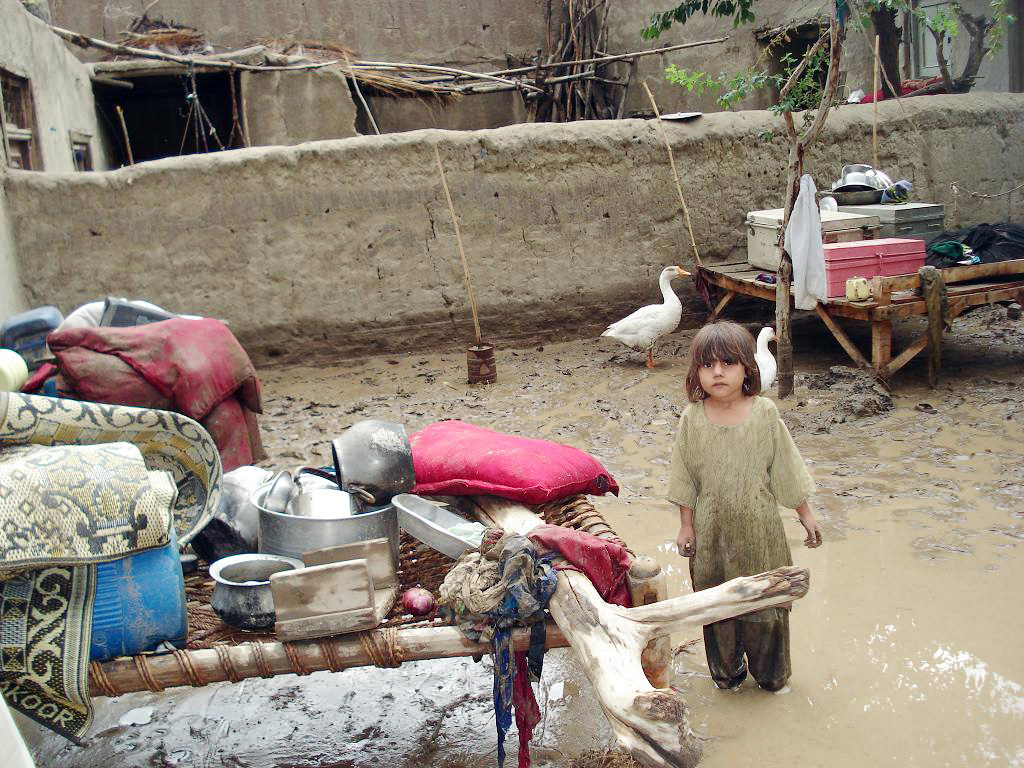The government of Afghanistan and UN agencies are pre-positioning humanitarian relief aid in 18 provinces of the country before snowfall and heavy rains block roads and impede access to areas with rugged terrain during the winter and early spring months.
In early 2007 hundreds of families affected by seasonal floods and avalanches in some isolated regions of the country repeatedly complained about lack of assistance due to aid workers’ inability to reach them.
Food and non-food items will be stocked in strategic locations from where it will be easy to deliver to those who need it after natural disasters.
Afghanistan is prone to various natural disasters, including floods, avalanches, landslides and earthquakes.
“Already 10,000 tonnes of wheat provided by WFP [the World Food Programme], has been stocked in various provinces and a further 10,000 tonnes will be dispatched in the near future, before first snowfall,” said Ghulam Haider, a senior official from the Afghanistan National Emergency Commission (NEC).
According to Haider, a joint plan entitled Winterisation 2007-2008 - adopted by the Afghan government and the UN - contains specific responsibilities for different stakeholders.
The ministries of Rural Rehabilitation and Development and Public Works have been tasked to keep main highways and peripheral roads clear of snow and ensure roads are kept open between districts and provincial capitals, officials say.
The Ministry of Defence has designated two military helicopters for use in possible evacuation operations.
During the first half of 2007 floods caused by heavy rains contaminated many water sources across the country and raised concerns about possible outbreaks of diarrhoea and other diseases.
The Ministry of Public Health, supported by the UN Children’s Fund (UNICEF), is working to avoid a similar situation in the coming winter by supplying rural health facilities with chlorine, sachets of oral rehyderation salts and other medications, officials at the Afghanistan Disasters’ Management Authority (ANDMA) said on 8 October.
US$3.5 million needed
ANDMA officials say 8,000 emergency family packages, including kitchen utensils, blankets and other non-food items, have already been prepared and will soon be dispatched to the most vulnerable provinces.
At least 30,000 more family packages should be delivered to disaster prone provinces such as Badakhshan, Ghor and Daykundi, Hassani told IRIN.
In some parts of the country health facilities lack the resources to prevent disease outbreaks and provide services for people, provincial authorities and local aid organisations said.
“We need US$3.5 million for health and other non-food preparations,” Haider of NEC said. However, donors have shown little interest in the NEC’s funding appeal, officials said.
Because “donors have different priorities,” Afghan President Hamid Karzai is expected to grant the requested funds through national resources, Haider said.
 Photo: Sarwar Amani/IRIN  |
| Roads become inaccessible during winter months in some parts of Afghanistan |
The restricted humanitarian room for manoeuvre in Afghanistan, with no direct access to one-third of the country, has been an increasing challenge for most aid workers, according to the UN: Taliban insurgents have repeatedly kidnapped, killed and harassed aid workers.
Furthermore, the virtual absence of the rule of law in large parts of the country has encouraged criminal groups to attack aid organisations.
The NEC has called on all warring parties in Afghanistan to allow humanitarian access to all parts of the country, particularly volatile areas, so that aid workers can ease suffering due to natural or man-made disasters.
“Humanitarian relief is apolitical, impartial… and should be respected by all sides of the conflict,” said Haider.
ad/at/ar/cb
This article was produced by IRIN News while it was part of the United Nations Office for the Coordination of Humanitarian Affairs. Please send queries on copyright or liability to the UN. For more information: https://shop.un.org/rights-permissions





